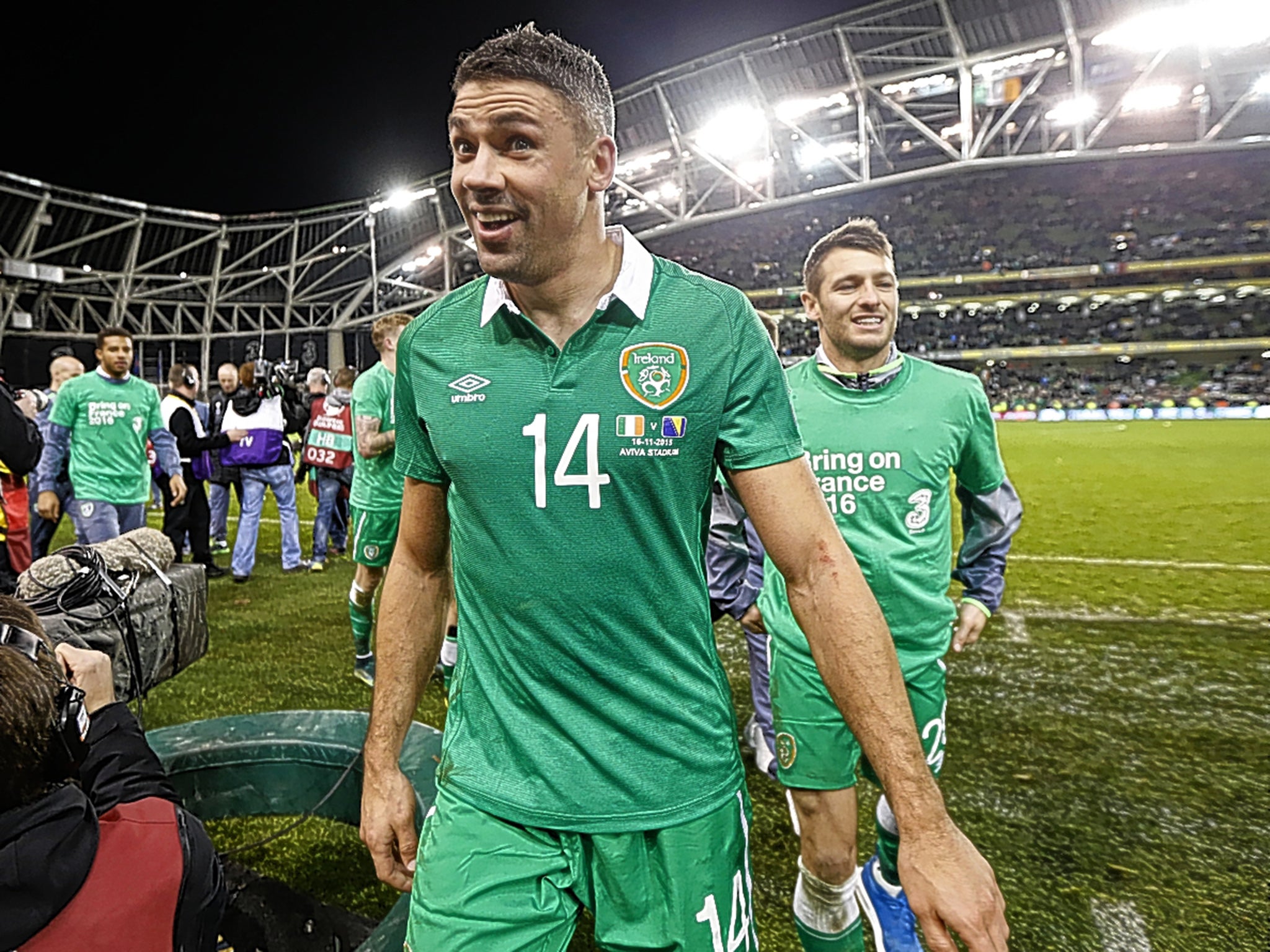Republic of Ireland Euro 2016: How Jonathan Walters battled back to represent motherland
Striker whose goals sent Ireland to Euros embodies the team spirit O’Neill has forged

When the hubbub finally subsided, after the Republic of Ireland had joyously qualified for Euro 2016 on Monday night, a lone figure walked out to the centre of the Aviva Stadium pitch for a quiet moment’s contemplation.
Given that he said of her afterwards, “She was smiling down on me tonight, I’m sure,” it is likely that Jonathan Walters was thinking of his mother Helen, a north Dubliner, who died when he was 11, more than two decades ago. It was in her honour that Liverpool-born Walters, while still a teenager, decided to play for the Republic of Ireland rather than England. It has proved a good choice.
While he was in demand for age-group teams as a youngster, it is unlikely Walters would have won a senior cap for England. He was 27 before he established himself in the Premier League, and then it was with Stoke City, who last fielded a regular England international in Mark Chamberlain 30 years ago.
Jack Butland may change that, but he is young and promising. Though Stoke have become newly fashionable under Mark Hughes, the role Walters plays for the Potters means, unlike Jamie Vardy and Rickie Lambert, other late developers, he would not be capped through sheer weight of goals.
Nor has Walters been – or ever will be – transferred for close on £30m, as was Edin Dzeko, who led the Bosnian attack against Walters’ Ireland in Dublin.
Walters’ impact, however, in the play-off and, indeed, Ireland’s qualifying campaign, eclipsed anything managed by his more celebrated opponent.
The 32-year-old’s two goals capped a display that epitomised Ireland’s endeavour and, it should be added, their composure. He will go to France next summer as important to Martin O’Neill’s plans as anyone in the England team is to Roy Hodgson’s.
Walters is one of those players who has maximised his talent. This is not a back-handed compliment; it is not as common as it ought to be and the same can be said of Cristiano Ronaldo, though the penny dropped rather sooner for the Portuguese.
It is more barbed praise to add that, in making the most of what he has, Walters typifies O’Neill’s Ireland. At times the boys in green played very well on Monday, but it was telling that more regular observers said it was the best they have played all campaign.
O’Neill does not have the players to draw on that his predecessors had – as the presence in the media ranks of Mark Lawrenson, Liam Brady and John Giles underlined. But only Lawrenson of that gifted trio made it to a major tournament and what Ireland now lack in individual talent they make up for in collective desire.
O’Neill stressed how much his players wanted to play for their country – contrary to what he had been told when taking the job two years ago.
One player remains estranged, and while Stephen Ireland’s club form has long been inconsistent he is the sort of creative player Ireland lack – as the eager pursuit of Jack Grealish showed. With Aiden McGeady struggling to make an impact at Everton, too much of the burden falls on Wes Hoolahan.
Nor, in truth, is there much on the horizon (as the Grealish flirtation also confirmed). The team is much changed from the side that figured in the final tie of the ill-fated Euro 2012 expedition, with only Glenn Whelan starting both matches, but of the 14 that figured on Monday only 23-year-olds Robbie Brady and Jeff Hendrick are under 25. Five players are over 30.
Reaching France will mean a significant cash injection into FAI coffers, which should aid investment into the production of young players. England, of course, have had similar problems, but with a far larger population base it is nothing like as acute.
That is for the future. For now the focus is on next summer. The Republic of Ireland, like Wales and Northern Ireland, will be in the fourth pot of seeds, which is likely to mean a difficult draw. But, as O’Neill’s men showed in beating Germany, that sometimes brings the best out of the team. O’Neill has settled into the role of manager and he and assistant Roy Keane now appear a strong partnership.
Though eyebrows were initially raised about his team selections, O’Neill got both play-off matches tactically right and used his substitutes well. It will help if Stephen Ward gets regular playing time (or another left-back emerges) but this astute, thoughtful manager will not fear anyone in next month’s draw. Nor will his players.
Subscribe to Independent Premium to bookmark this article
Want to bookmark your favourite articles and stories to read or reference later? Start your Independent Premium subscription today.

Join our commenting forum
Join thought-provoking conversations, follow other Independent readers and see their replies